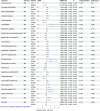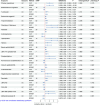Circulating Inflammatory Proteins Mediate the Causal Effect of Gut Microbiota on Inflammatory Bowel Disease: Bayesian and Mediated Mendelian Randomization
- PMID: 40654330
- PMCID: PMC12246389
- DOI: 10.1096/fba.2025-00114
Circulating Inflammatory Proteins Mediate the Causal Effect of Gut Microbiota on Inflammatory Bowel Disease: Bayesian and Mediated Mendelian Randomization
Abstract
Inflammatory bowel disease (IBD), including Crohn's disease (CD) and ulcerative colitis (UC), presents a global public health challenge. Although the relationships between gut microbiota, inflammatory proteins, and IBD are recognized, their causal associations and mediating roles remain unclear. Large-scale genome-wide association study data on 473 gut microbiota, 91 circulating inflammatory proteins, and IBD (including CD and UC) were analyzed. Univariable Mendelian randomization (UVMR), Bayesian Weighted MR (BWMR), mediation MR, and sensitivity analyses were used to explore causal associations and quantify mediating effects. MR results indicate that 24, 20, and 22 gut microbiota exhibit causal effects on IBD (nine protective factors, 15 risk factors), CD (nine protective factors, 11 risk factors) and UC (seven protective factors, 15 risk factors). Three inflammatory proteins (one protective factors, two risk factors) have causal effects on IBD, with five having causal effects on CD (one protective factors, four risk factors) and UC (two protective factors, three risk factors). Mediation analysis reveals that Interleukin-17C levels mediate the causal effects of Acetobacterales and Bifidobacterium on IBD. T-cell surface glycoprotein CD6 isoform levels mediate the causal effect of Faecalibacterium prausnitzii E on CD. Interleukin-17C levels also mediate the causal effects of Acetobacterales on UC and Phocea massiliensis on UC. Gut microbiota and circulating inflammatory proteins play key roles in IBD pathogenesis, with Interleukin-17C and T-cell surface glycoprotein CD6 identified as key intermediates in the causal pathway. These findings provide novel biomarkers and potential therapeutic targets for preventing and treating IBD, CD, and UC.
Keywords: Crohn's disease; Mendelian randomization; circulating inflammatory proteins; gut microbiota; inflammatory bowel disease; ulcerative colitis.
© 2025 The Author(s). FASEB BioAdvances published by The Federation of American Societies for Experimental Biology.
Conflict of interest statement
The authors declare no conflicts of interest.
Figures






References
-
- Baumgart D. C. and Carding S. R., “Inflammatory Bowel Disease: Cause and Immunobiology,” Lancet 369, no. 9573 (2007): 1627–1640. - PubMed
-
- Lennard‐Jones J., “Classification of Inflammatory Bowel Disease,” Scandinavian Journal of Gastroenterology 24, no. sup170 (1989): 2–6. - PubMed
-
- Marks D. J., Harbord M. W., MacAllister R., et al., “Defective Acute Inflammation in Crohn's Disease: A Clinical Investigation,” Lancet 367, no. 9511 (2006): 668–678. - PubMed
LinkOut - more resources
Full Text Sources
Miscellaneous
